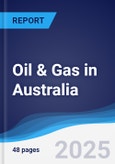Key Highlights
- The oil & gas market volume is defined as the total consumption (barrels of oil equivalent) of refined petroleum products and natural gas in each country in a specific year. The value of the oil segment reflects the total volume of refined petroleum products, including refinery consumption and losses, multiplied by the average retail price of gasoline and diesel taken together. The value of the gas segment is calculated as the total volume of natural gas consumed multiplied by the retail price of natural gas.
- The Australian oil & gas market recorded revenues of $74.7 billion in 2024, representing a negative compound annual growth rate (CAGR) of 0.3% between 2019 and 2024.
- Market consumption volumes declined with a negative CAGR of 0.6% between 2019 and 2024, reaching a total of 633.2 million BoE in 2024.
- According to the publisher, Australia captured a share of 3.1% in the Asia-Pacific oil & gas market value, in 2024.
Scope
- Save time carrying out entry-level research by identifying the size, growth, major segments, and leading players in the oil & gas market in Australia
- Use the Five Forces analysis to determine the competitive intensity and therefore attractiveness of the oil & gas market in Australia
- Leading company profiles reveal details of key oil & gas market players’ global operations and financial performance
- Add weight to presentations and pitches by understanding the future growth prospects of the Australia oil & gas market with five year forecasts
Reasons to Buy
- What was the size of the Australia oil & gas market by value in 2024?
- What will be the size of the Australia oil & gas market in 2029?
- What factors are affecting the strength of competition in the Australia oil & gas market?
- How has the market performed over the last five years?
- What are the main segments that make up Australia's oil & gas market?
Table of Contents
Companies Mentioned (Partial List)
A selection of companies mentioned in this report includes, but is not limited to:
- Exxon Mobil Corp
- BHP Group Ltd
- Woodside Energy Group Ltd
- Ampol Ltd








